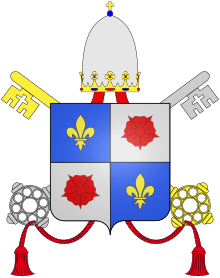Urban IV.
Urban IV , originally Jacques Pantaléon (* before 1200 in Troyes , † October 2, 1264 in Perugia ), was Pope from 1261 until his death .
Career
Urban IV was the son of a cobbler in Troyes. He studied in Paris theology and was initially canon in Laon , then archdeacon in Liege . Innocent IV entrusted him with a legation to the German East, where in 1248 he headed a synod of the Gnesen ecclesiastical province in Breslau . In 1251 Innocent IV made him Bishop of Verdun . The skillful administration of this heavily indebted diocese prompted Alexander IV to make him Patriarch of Jerusalem in 1255 .
On August 29, 1261 he was elected in a three-month conclave comprising only eight cardinals and was crowned on September 4 of the same year. Since he himself had not been promoted to cardinal, he did not belong to this conclave.
pontificate
During his pontificate , Urban IV resided in Orvieto and Viterbo and never set foot in Rome . He continued the anti-Hohenstaufen policies of his predecessors. King Manfred of Sicily made the Pope an offer of peace that was also financially strong. In return, the Pope should recognize Manfred as King of Sicily. But the offer failed due to the distrust of the anti-Hohenstaufen curia. The Pope now made a fateful decision for the papacy as well. Urban decided to give Count Karl von Anjou , the warlike brother of the French King Louis IX. of the saint with Sicily and laid down the conditions for this in twenty-four articles in June. The alliance of this first French pope of the century with France began the French dependence of the papacy, which was to reach its climax in the Avignon papacy . King Ludwig had already recognized the succession of the young Konradin von Hohenstaufen and disapproved of the Pope's wooing for his brother. Although (or perhaps because) the Pope was aware of the ruthless character of Charles of Anjou, he insisted on his feud. On June 28, 1263, the Pope declared Edmund of Lancaster's enfeoffment with Sicily by his predecessor Alexander IV in 1255 to be extinguished and transferred it to Count Karl in the Treaty of Viterbo on August 15, 1264. The fact that the latter did not take the Pope's wishes and expectations into account became apparent when he immediately demanded that the Pope grant him the title of Roman senator for life. Now the Pope was, also in his own words, "between Scylla and Charybdis". In doing so, the Pope had triggered a development that he could not even remotely overlook.
In August 1261 the Latin Empire of Constantinople was recaptured by the Byzantines . Urban IV then tried unsuccessfully to initiate a crusade to rebuild the empire.
On August 11, 1264, he ordered the bull transiturus the feast of Corpus Christi as a feast for the whole Church. He died in Perugia in the same year and was buried in the local Cathedral of San Lorenzo . In 1935 his bones were brought to the basilica of St-Urbain, which he had donated, in his native Troyes and buried in the choir.
Legend
According to legend, it was Pope Urban IV who refused absolution to Tannhauser, who had returned from the Venusberg , because he could get as little salvation as the priest's staff could blossom in his hand. In the legend, of course, the priest's staff turns green in spite of the papal dictum , which is why the legend sees the damnation thrown on Urban IV.
See also
literature
- Ex Urbani IV registro. In: Epistolae saeculi XIII e regestis pontificum Romanorum selectae . Part 3. Edited by Karl Rodenberg. Berlin 1894, pp. 474–626 ( Monumenta Germaniae Historica , digitized version )
- Georg Kreuzer: Urban IV. In: Biographisch-Bibliographisches Kirchenlexikon . (BBKL) Vol. 15 (1999) , Col. 1395-1398.
Web links
Individual evidence
- ^ Franz Xaver Seppelt : History of the Popes , Volume 3, Munich 1956, p. 501f.
| predecessor | Office | successor |
|---|---|---|
| Alexander IV |
Pope 1261-1264 |
Clement IV |
| Johann II. |
Bishop of Verdun 1251–1255 |
Robert II |
| Robert |
Patriarch of Jerusalem 1255–1261 |
Wilhelm II. |
| personal data | |
|---|---|
| SURNAME | Urban IV. |
| ALTERNATIVE NAMES | Jacques Pantaléon |
| BRIEF DESCRIPTION | French clergyman; Pope (1261-1264) |
| DATE OF BIRTH | before 1200 |
| PLACE OF BIRTH | Troyes |
| DATE OF DEATH | October 2, 1264 |
| Place of death | Perugia |

